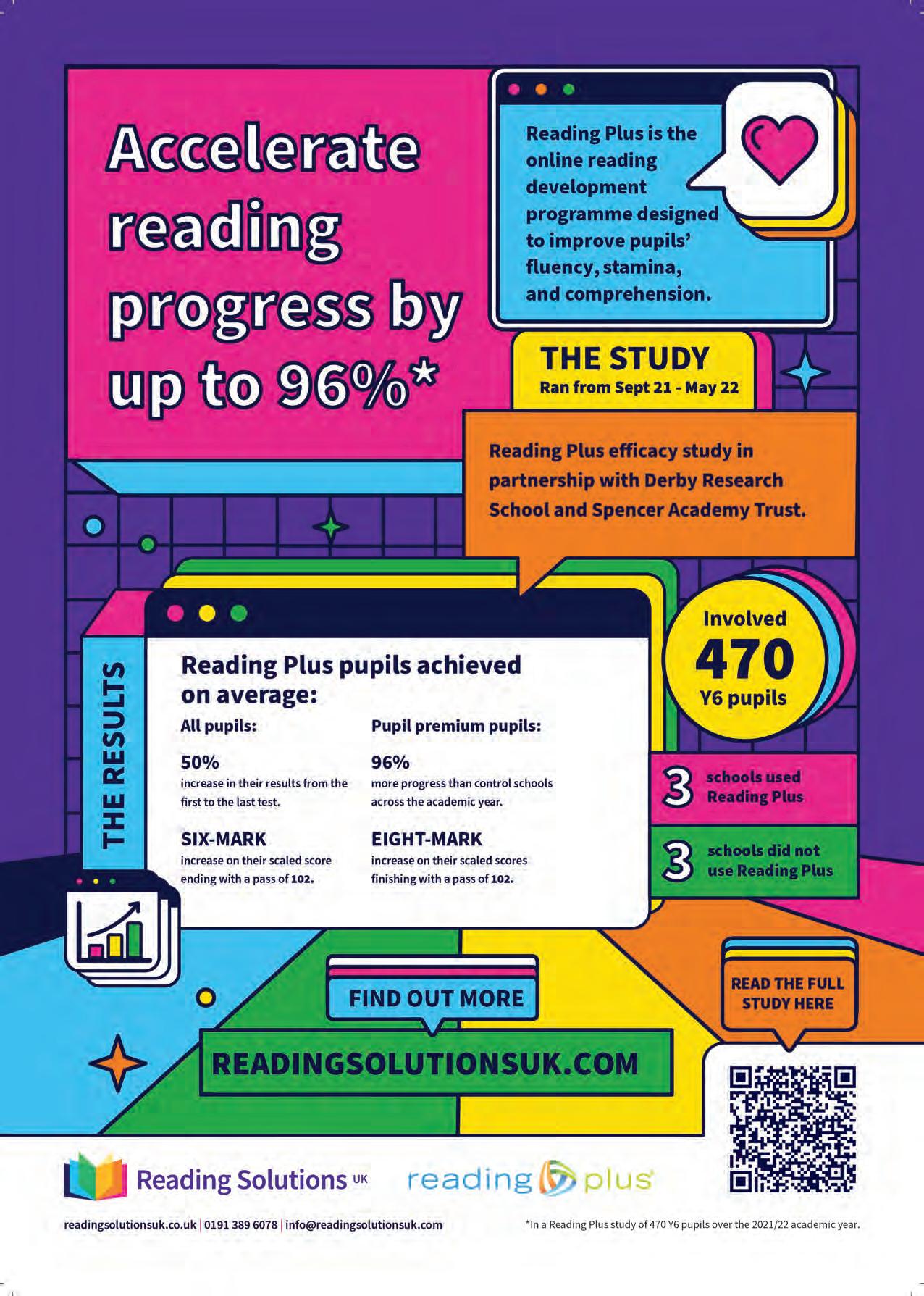Breastfeeding ruling
Clarifying employers’ duties

See page 9.

Breastfeeding ruling
Clarifying employers’ duties

See page 9.
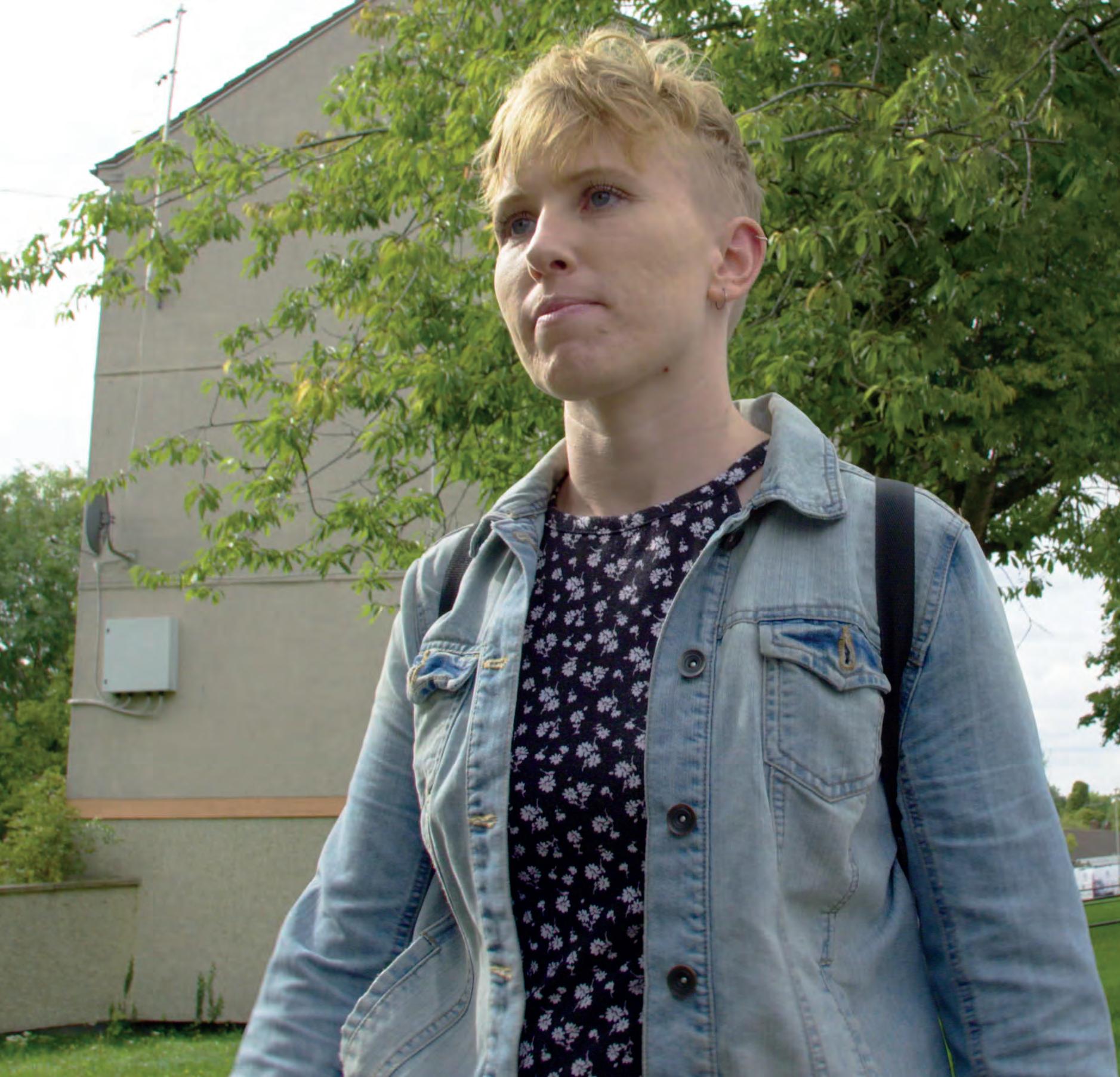
Leaders voting to strike as their staff struggle


Positioned for success Developing Black leaders
See page 12.
Professional supervision A space to reflect
See page 20. Autumn 2022
The magazine for NEU Leadership members
Lead. Autumn 2022 Faye Curran, interviewed for an NEU film on pay.

Photo still: HARK Films
NEU president: Louise Atkinson

NEU joint general secretaries: Mary Bousted & Kevin Courtney
Editor: Sally Gillen Editorial assistant: Sarah Thompson
neu.org.uk facebook.com/ nationaleducationunion twitter.com/NEUnion
Published on behalf of NEU by James Pembroke Media, 90 Walcot Street, Bath BA1 5BG jamespembrokemedia.co.uk
Senior editor: Michelle Royle t: 01225 337777 e: michelle.royle@james pembrokemedia.co.uk

Design manager: Christina Richmond
To advertise contact: t: 020 7880 7614 e: lead-magazine@redactive. co.uk
Ad artwork coordinator: Rachel Young rachel.young@redactive.co.uk
Except where the NEU has formally negotiated agreements with companies as part of its services to members, inclusion of an advertisement in Lead does not imply any form of recommendation. While every e ort is made to ensure the reliability of advertisers, the NEU cannot accept any liability for the quality of goods or services o ered. Lead is printed by Walstead.
WE are now weeks into the union’s national pay ballot, with hundreds of votes coming in every day. Hopefully yours has been among them. If not, there is still time. Please do use your vote and post it back as soon as possible (see page 4).

Many leaders are voting Yes to strike action if the Government doesn’t improve its meagre five per cent pay offer, and fully fund it, not just for themselves, but for their staff. Seeing their hard-working colleagues struggle is simply too much. Seeing schools underfunded is too much. It is truly shocking that teachers are taking second and third jobs to pay the bills, that they are facing the indignity of asking family for cash because they can’t manage on their teaching salary, that they cannot afford childcare. Head teachers are having to make terrible choices.
Teachers’ pay has gone down by 20 per cent since 2010.
So when another member of staff says they are leaving, hot on the heels of the last, many leaders understand why. But they are also dismayed (see page 10). The loss of one talented staff member after another is making it impossible for them to run their schools.
Sister unions the NAHT and NASUWT are also formally balloting. The NAHT is balloting for the first time in its 125-year history. None of us has been left with any other option. Please post your paper and please vote Yes.
If we get the Yes vote, we will begin strikes at the end of January. There is always a chance that the Government will see sense and offer the fully funded, above-inflation rise we are demanding. But it is a slim one.
Kevin Courtney



Joint general secretary
National Education Union
lead. The magazine for NEU
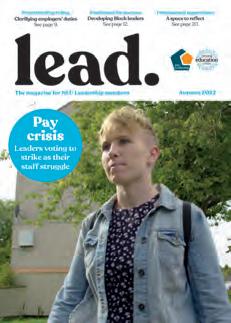

VOTING in the union’s ballot of members across England and Wales is now underway, which could result in the rst strikes in education for a generation from January.
their families and nancial help from friends and family.
Teachers are leaving in droves, deepening the recruitment and retention crisis and leaving leaders struggling to ll posts. Support sta are leaving education for better-paid jobs in the retail, hospitality and or care sectors.
Leaders are among 300,000 teachers and support sta being asked if they would be prepared to take strike action if the Government fails to give teachers a fully funded, above-in ation pay rise.
Mary BoustedIn the summer, the Government announced a ve per cent pay rise, which at a time of soaring in ation amounts to a seven per cent pay cut. On the back of years of below-in ation pay rises, teachers have now had a 20 per cent pay cut since 2010.
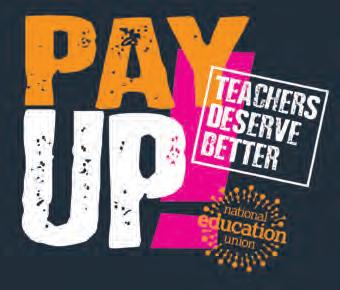
Support sta have had a 27 per cent cut over the same period.
Many are being pushed into poverty. ey are being forced to take second jobs to pay the bills, rely on food banks to feed
Announcing the formal ballot, NEU joint general secretaries Mary Bousted and Kevin Courtney said: “ e strength of feeling should not be underestimated. Teachers work among the longest hours of any profession, and according to the OECD, those working in England work longer hours than teachers anywhere else in Europe.
“Pay, along with workload, lies at the root of a recruitment and retention crisis which should be of deep concern to the Government, but about which they have been completely ine ective.”
ey added that the DfE’s own gures show one in eight teachers leave within
their rst year, a quarter within three years of qualifying and almost a third are gone within ve years. e DfE routinely misses its own trainee targets.
A preliminary ballot carried out between September and October returned an 86 per cent Yes vote. e NEU’s formal, postal ballot began on 31 October and will run until 13 January.
Sister unions NAHT and NASUWT are also formally balloting members. A survey by NAHT found 64 per cent wanted to be balloted on strike action.
Mary and Kevin said: “ e Government’s refusal to fully fund the meagre pay rise for 2022/23 is the nal insult. We repeat our willingness to meet with Government to nd a serious answer to more than a decade of declining pay.”
THE union has issued members with a formal postal ballot asking you to vote YES in favour of strike action to win a fully funded, above-infl ation pay rise.
• The envelope is marked YOUR NEU BALLOT PAPER ENCLOSED.

• If your ballot paper doesn’t arrive, email ballotenquiries@ neu.org.uk as soon as possible.
• Please vote as soon as you receive the ballot paper, as postal delivery may be slow due to strikes by CWU.
• Our sister unions the NASUWT and NAHT are also balloting their members.
• We are urging you to vote YES By law, a formal ballot for action needs to be postal.


• At least 50 per cent of eligible members need to vote, with at least 40 per cent voting in favour of action.


PLEASE USE YOUR VOTE.

“The strength of feeling should not be underestimated.”
SCHOOL leader Kari Anson has become the first in the country to sign up to the union’s pledge to prevent sexism and sexual harassment at her school.
The union is calling on all schools to publicly make the pledge.
Kari attended a one-day conference in September to launch It’s not ok, a toolkit for implementing a wholeschool approach to tackling sexism and harassment.

It includes posters, model policies, template letters, lesson plans and chatcasts with teachers who have done innovative work to address the issues.
The scale of the problem, which is experienced by staff and students in schools, has been a growing concern since the union and charity UK Feminista published a groundbreaking report in 2017 titled It’s just everywhere. It found 37 per cent of female students at mixed schools had been sexually harassed, and 78 per cent were not aware of any policies
in their school to tackle sexism.
Last year, the Government asked Ofsted to carry out a rapid review, which concluded that sexism and sexual harassment has become “normalised” in schools.
The NEU has been at the forefront of the fight to end sexism and sexual harassment in schools and the It’s not ok toolkit offers practical advice on what members can do in their workplaces.
A panel that included Louise Regan, NEU executive member for equality and membership, Heather McKenzie, chair of the women’s organising forum, Charlotte Carson and Denise Henry, seat holder for Black members, discussed how to organise to prevent sexism and sexual harassment in schools.
Members also attended a range of workshops.
Go to neu.org.uk/end-sexism-sexualharassment
GRANTS of £1,200 for mental health training are available from the Department for Education for schools and colleges.
Funding will help the school mental health lead measure need and monitor:
• the impact of interventions;
• understand the mental health needs of vulnerable groups of pupils such as those with a social worker and young carers;
• put in place strategies to support staff and learners’ mental health;
• strategies to develop positive relationships with parents, families and carers.
The grant can be
spent on one of over 100 quality assured courses, delivered online or in-person, and beginner, intermediate or advanced levels. It can also be used to pay for supply cover to backfill the mental health lead while they are training.

Go to onlinecollections.des. fasst.org.uk/fastform/ senior-mental-healthleads
See How I…page 16
A DEVELOPMENT programme for aspiring Black leaders, funded by the NEU, will start in January. Applications are now open. The sixth-month programme, Positioned for success, is designed to help tackle the persistently low number of Black leaders in education.
It is open to Black NEU members, based in a school or post-16 college, with at least three years’ experience who are looking to take the next step in their career.
Tutors Marva Rollins and Dolapo Ogunbawo, both highly experienced school leaders, have been delivering bespoke
training for Black teachers for 15 years.
Their new course, delivered in partnership with the NEU, covers a broad range of skills needed to move into or upwards in education leadership including submitting top class job applications and interviewing skills.
The application deadline is 9 December. Places are fully funded by the union, which will also cover reasonable travel expenses.
To book neu.org.uk/ black-leaders-course See an interview with Marva Rollins and Dolapo Ogunbawo on page 12
lead. The magazine for NEU Leadership
TESTS in primary schools should be replaced with a system that prioritises children’s learning over league tables, a report published by an independent commission on primary assessment has recommended.
Reception baseline, phonics screening check, key stage 1 SATs and the multiplication tables check should be removed now and replaced by teacher assessment.
Year 6 SATs should be phased out.
Head teachers, teachers, and researchers are among the commissioners, who have based their findings on years of research, two new surveys of parents and educators, and their own expertise.
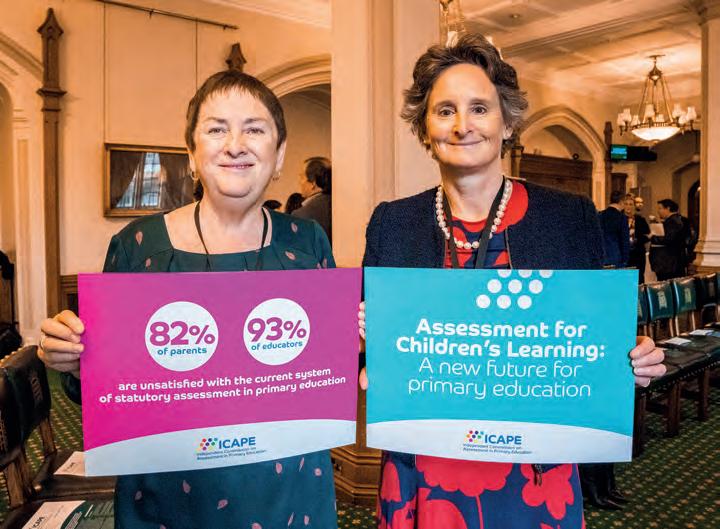
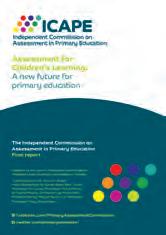
Most educators surveyed (93 per cent) and parents (82 per cent) were unsatisfied or very unsatisfied with the system of statutory assessment, while more than three-quarters of both teachers and parents agreed that there should be no government tests in primary schools.
Co-chair of the commission Professor Alice Bradbury, a former primary school teacher who is based at IOE, UCL’s
Faculty of Education and Society, said the commission’s research showed the need to move away from high pressure tests that only tell teachers how a child performs on a specific day.
She added that implementing more flexible assessments by teachers would showcase a child’s successes and identify areas in which they need help.
At the report’s launch in Parliament, NEU joint general secretary Mary Bousted said: “Putting children through a Victorian curriculum in the 21st century is not productive. We took a wrong turn and we need to correct it. The time has come for us to look seriously at how assessment is dominating teaching and
• Year 6 SATs should be phased out. The other high stakes assessments (Reception baseline, phonics screening check, key stage 1 SATs and the multiplication tables check) should be removed immediately and replaced by more emphasis on teacher assessment.
• The performance of the school system over time should be evaluated through the use of a new system of nationally representative sampling of pupils, meaning only a small number of children will sit Government tests.
• Proof of children’s learning and attainment across their primary education would be demonstrated by a profile of evidence that draws on a variety of assessment methods and reflects pupils’ wider achievements, as well as their performance in key subjects.
• Children in Year 1 and again in Year 4 would be assessed to provide information allow educators to identify gaps in learning and allow for improvements. These assessments would take place at times throughout the school year, suitable to the individual needs of each child. Teachers would use these assessments, designed at national level, to support a child’s learning and not to measure schools, as is currently the case. The assessments would be designed in consultation with teachers, school leaders and subject experts.
To read the report go to icape.org.uk
“We are putting children through a Victorian curriculum.”
learning in primary schools.”
primaries
THE union and The Mirror newspaper have launched a campaign calling for the Government to extend free school meal provision (FSM) to every primary school pupil in England.
FSM are available for all primary school children until the end of year 2, but from year 3 onwards, millions of children miss out on a meal at school.
In a letter to former Prime Minister Liz Truss, signed by over 100 MPs, faith groups, charities and celebrities including former footballer Gary Lineker and chef Tom Kerridge, the NEU wrote:
“We are living through the greatest cost-of-living crisis in a generation, and too many families with young children are being pulled into poverty.
“Teachers and support staff see the difference a healthy school dinner makes. When children are hungry, they can’t learn. It’s hard for them to concentrate and harder for them to reach their potential. free school meals for all would mean every child can learn and succeed.”
England is already well behind in supporting children living below the poverty line. In 2020, Scotland pledged to extend FSM for every child in primary education, and this year Wales did the same. In its letter, the NEU has made it clear that “it is time for England to catch up”.
To sign the letter demanding the Government commit to extending FSM to every child in primary school, visit: nochildleftbehind.org.uk
NEU joint general secretary Mary Bousted welcomed the appointment last month of Gillian Keegan, the fifth Education Secretary in four months. “We look forward to meeting Gillian Keegan to discuss and resolve the pressing issues facing an education system that her predecessors have run into the ground,” she said.
PUPILS should not be stopped from wearing natural Afro hair styles at school, the Equality and Human Rights Commission says in new guidance for schools. It has produced resources to help school leaders ensure hair and hairstyle policies are not unlawfully discriminatory. The resources include a decisionmaking tool to help school leaders draft and review their policies.
equalityhumanrights.com/en/ advice-and-guidance/ preventing-hair-discriminationschools-decision-making-tool
COLLEEN Johnson, seat holder for disabled members on the NEU executive, presented the award for SEND leader of the year at the National Association for Special Educational Needs awards. Award winner Pearl Barnes, who has worked with children
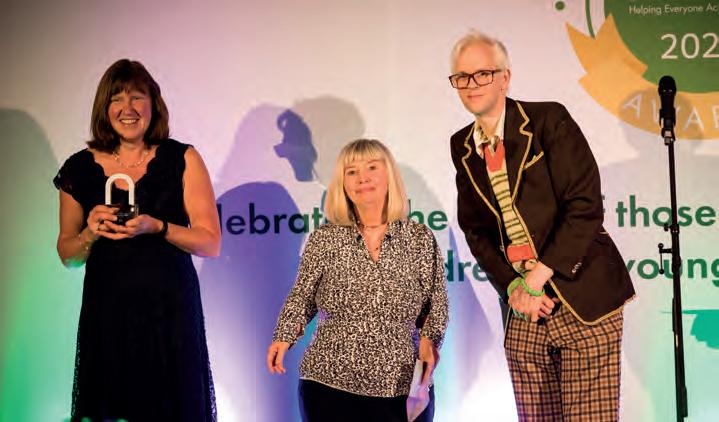
and young people with SEND for more than 20 years, supports schools through audits and training, helping SENCOs and school heads to develop outstanding SEND provision. She accepted her award at a ceremony in Birmingham in October.
ADVICE leaflets to help classroom teachers support children and young people’s language and communication skills have been produced by the union and speech and language specialists ICAN. The Covid-19 pandemic has meant the number of children experiencing difficulties in this area is rising. The leaflets include tips for understanding language progression and signposting to resources.
neu.org.uk/supportinglanguage-development
lead. The magazine for NEU Leadership
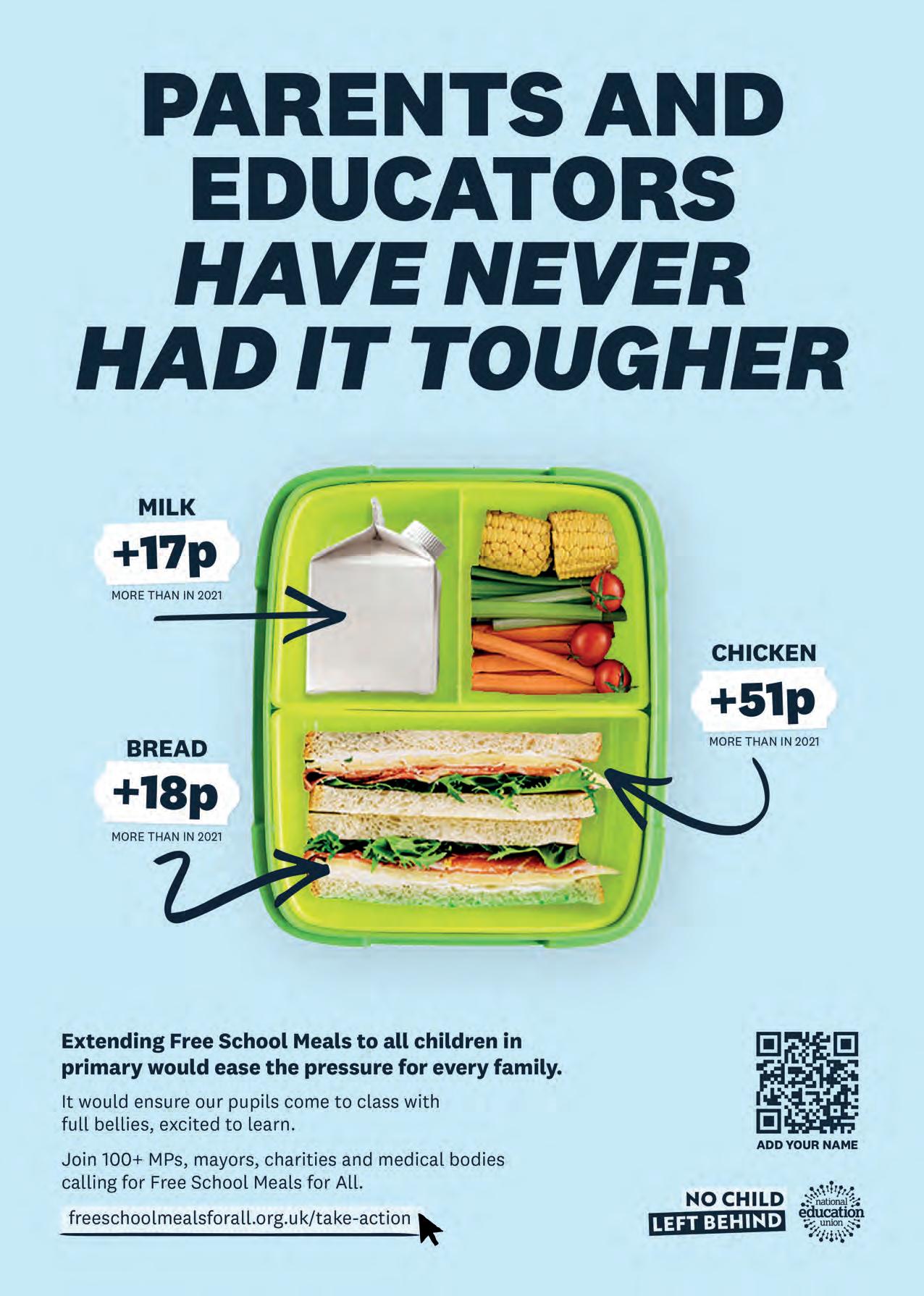
SCHOOL and college leaders are being urged by the union to review their arrangements for supporting breastfeeding women returning from maternity leave, following a landmark employment tribunal ruling.
Middle leader Tara Mellor took The Mirfield Free Grammar (MFG) to tribunal, supported by the NEU, after she was forced to express breastmilk for her 12-week-old baby in dirty school toilets and in the car park during her 25-minute lunchbreak.
The tribunal found that the school had created a“degrading and humiliating” environment for Tara, which amounted to harassment on the basis of her sex.
The case was brought under the Equality Act 2010.
Left with no choice Tara returned to work in September 2020 and repeatedly requested a room in which to
express milk, but leaders failed to provide one. She was then left with no choice but to use the toilets and car park.
“It was cold and draughty in the toilets because all the windows were open for ventilation and I had to lay out my jacket to sit on,” she says. “The floor often had urine sprinkles on it and there were paper towels from an overflowing bin. Sometimes I was really hungry, so I would sit and eat on the floor. It was disgusting.”
Her case highlights the appalling treatment of some new mothers returning to work.
The NEU’s maternity rights 2022 survey of more than 3,700 members found that 41 per cent are still breastfeeding when they go back to work. Some members reported having to express milk in store cupboards, science labs, changing rooms and toilets.
The tribunal rejected the school’s
claim that Tara had not submitted a complaint or grievance so could not have viewed it as a “real issue”.
In 2021, she felt she had no option but to resign.
Former colleague Claire Pickles, also a middle leader at MFG, had a similar experience. She, too, resigned just a few weeks after returning from maternity leave in September 2021.
On her first day back at work, Claire discovered that a room to express milk in that she had been promised by the head teacher – who has since left – had instead been given to a governor. Claire says the lack of support she received as a new mother returning to teaching led her to believe it was impossible to be a mum and a teacher.

The last straw was when the deputy head rolled her eyes and said “for God’s sake” when Claire requested to leave work early after her son’s nursery called to say he was ill.
“She is also a mum and I thought ‘why aren’t you being a bit kinder to someone who is a new mum?’. If I’m ever in leadership in the future, I’ll be a ten times better leader than they were.”
NEU legal officer Sandra Bennett says: “This judgment has clarified the extent of employers’ duties towards working women who are breastfeeding. School and college leaders would be well advised to review their arrangements for supporting breastfeeding women returning from maternity leave. An individual risk assessment should be arranged for a member of staff who advises that she is still breastfeeding.
“Arrangements should be made for her to access a suitable area where she can rest. This space should be hygienic and private so that she can express breastmilk if she needs to. Rest breaks should also be co-ordinated according to her need to avoid the risk of leaking breastmilk or becoming ill. In line with guidance from the Health and Safety Executive, employers should also provide somewhere to store breastmilk, for example a fridge.”
Many employers can and do provide appropriate support, facilities and breaks for breastfeeding mothers. The NEU is calling on all employers to uphold breastfeeding women’s rights at work. We want to see breastfeeding risk assessments, flexible adjustments to work arrangements, suitable rest facilities and dedicated paid breastfeeding breaks. Go to hse. gov.uk/mothers/employer/restbreastfeeding-at-work.htm
lead. The magazine for NEU Leadership
A middle leader won a case against her former school after it failed to provide a suitable space for her to express milk. Sally Gillen reportsTara Mellor took her school to tribunal when they failed to provide adequate breastfeeding facilities Photo: Matt Wilkinson
IT has taken 12 years, but leaders’ patience has nally run out. Years of below-in ation pay rises means teachers’ pay has plummeted 20 per cent since 2010. At any time this would be very bad news, but when the country is facing the worst cost-of-living crisis for a generation, it is nothing short of a disaster.
Recruitment and retention problems, which have been growing over the last decade primarily because of excessive workload, have been pushed to crisis levels by falling pay.
Workload and poor pay are driving thousands of educators to quit. ey simply cannot a ord to stay in teaching.
First ballot since NAHT was founded Worse still, this year’s meagre pay award for teachers of just ve per cent – a realterms cut of seven per cent because of soaring in ation – is not fully funded. It is insult added to injury, say NEU joint general secretaries Mary Bousted and Kevin Courtney. e reality is that for many heads it will be impossible to nd the hundreds of thousands of pounds for sta pay rises.
It is a dire situation for school leaders. at’s why thousands of NEU Leadership members are, like their peers at sister union the NAHT, voting Yes in formal ballots for strike action on pay.
e NAHT’s ballot is the rst in its 125-year history. is fact alone tells a story. e NEU is weeks into the formal ballot launched at the end of last month, following a preliminary ballot of teachers,
I have been in teaching for 20 years. I am a single mum with a mortgage, and life has been getting more and more difficult financially. I’m really worried about mortgage rate increases as I have no more money. It has got to the stage where I feel I can’t afford to do my job anymore. This makes me sad as I love my job, I love my school, I feel like I can make a real difference. If we were paid in line with real-time inflation we would not be losing so many amazing teachers and support staff from the profession. We deserve better.
Hannah, West Bromwich.
including leaders, who voted by 86 per cent to strike if the Government doesn’t improve its pay o er.
Lawrence*, a leader in the north of England, says that he and all NEU members voted to strike in the preliminary ballot and have done so again
in the formal one.
“Our teachers should be able to focus on doing their job, instead of worrying about whether they have enough money to make it until the end of the month,” he argues. “You can see the level of stress in sta is going up because of the costs
Staff are leaving in droves, and many of those staying are being forced take second jobs. Sally Gillen talks to leaders about the impact of the pay crisis.
‘We
at home and at work. When I talk to colleagues about pay being cut by 20 per cent, I point out that in real terms they are working a day a week for free.”
He often wonders, he says, how members of his sta such as teaching assistants (TA) survive. He, as a reasonably well-paid leader, has very little left at the end of the month, so it must be impossible for those earning much less.
Lawrence isn’t surprised when support sta hand their notice in – as one highly experienced TA did recently – to take up a better paid job in a shop.

He understands, but each resignation is nonetheless another loss impacting the sta team and the children. His school su ers.
Impact on wellbeing Alan*, a leader in the south of England, has voted to strike. He shares a number of stories illustrating the widespread impact of pay cuts at his school.
He met recently with a newly appointed faculty leader struggling to meet all his payments, and he re ected that because he’s at the top of the teachers’ scale, and paid the highest TLR in the school, he is unlikely to see his pay rise. His disheartenment grew when he considered the future: unless the Government changes its policy, every year for the rest of his working life his pay will go down.
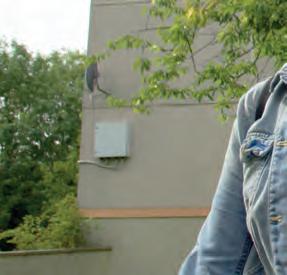

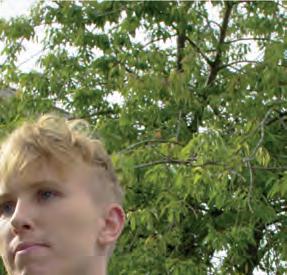
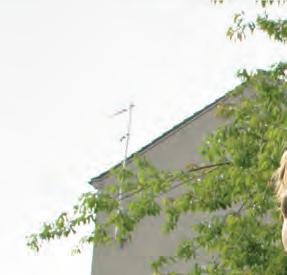
“It was honest, truthful and dispiriting, but as a leader I couldn’t hide from the fact he’s right. He’s a very positive individual, but there’s no doubt that this
realisation has had an impact on his longterm motivation.”
Alan is also concerned about some of his teachers, single mothers juggling work and home commitments, who in the last year have had to take on work in the evenings to pay the bills. “ ey work very hard. e day job is demanding, as we all know. e exhaustion then has a profound impact on their capacity to teach, their energy levels, their resilience to deal with challenging pupils. It’s a vicious cycle of decline,” he says.
Head teacher Kulvarn Atwal, who oversees two primary schools in east London, agrees. “Teaching is a challenging enough job in itself, without people having to do a second job, which is becoming more and more common. Ultimately, this is going to impact teachers’ mental and physical health.”
at is, of course, the inevitable end point.
And while wellbeing is uppermost in leaders’ minds, at the same time as understanding that sta have no choice but to nd ways to supplement their income, leaders are also acutely aware of the potential impact on teaching and learning, for which they are accountable.
“It is essential to recognise the situation, extend empathy but also balance that with a sustained level of reasonable expectation,” says Alan.
Managing an exhausted and demoralised sta is one thing, and it is placing signi cant strain on leaders, but so too is the increasing di culty many are
now experiencing in recruiting new sta because of falling rates of pay. Teachers and support sta – the latter can get more money working in the retail or care sectors – are leaving and becoming increasingly hard to replace.
Leaders have had enough Lawrence says: “I’m worried about being able to get sta . It’s not just about the numbers but also the competency. e 55- to 65-year-olds who have so much experience and would normally take newer, younger members of sta under their wing, they are just not there. ere is a dearth of experience.”
Poor pay is just another pressure heaped on leaders, he adds, coming on top of years of underfunding, the Covid-19 pandemic, the loss or reduction of key services that schools reply on, such as child and adolescent mental health services and children’s social care, and now a cost-of-living crisis. Leaders have simply had enough.
“One day recently, I was at work, and I went into my o ce and cried. I was just so frustrated and angry that the only thing working in many of the children’s lives is school, and I don’t know how much longer it will keep working for. Everything has been so run down and we just feel like we are wading through treacle trying to keep the show on the road.
“ is can’t carry on. We are losing good people.”
* Not their real names
lead. The magazine for NEU
“Teaching is a challenging enough job in itself, without people having to do a second job.”
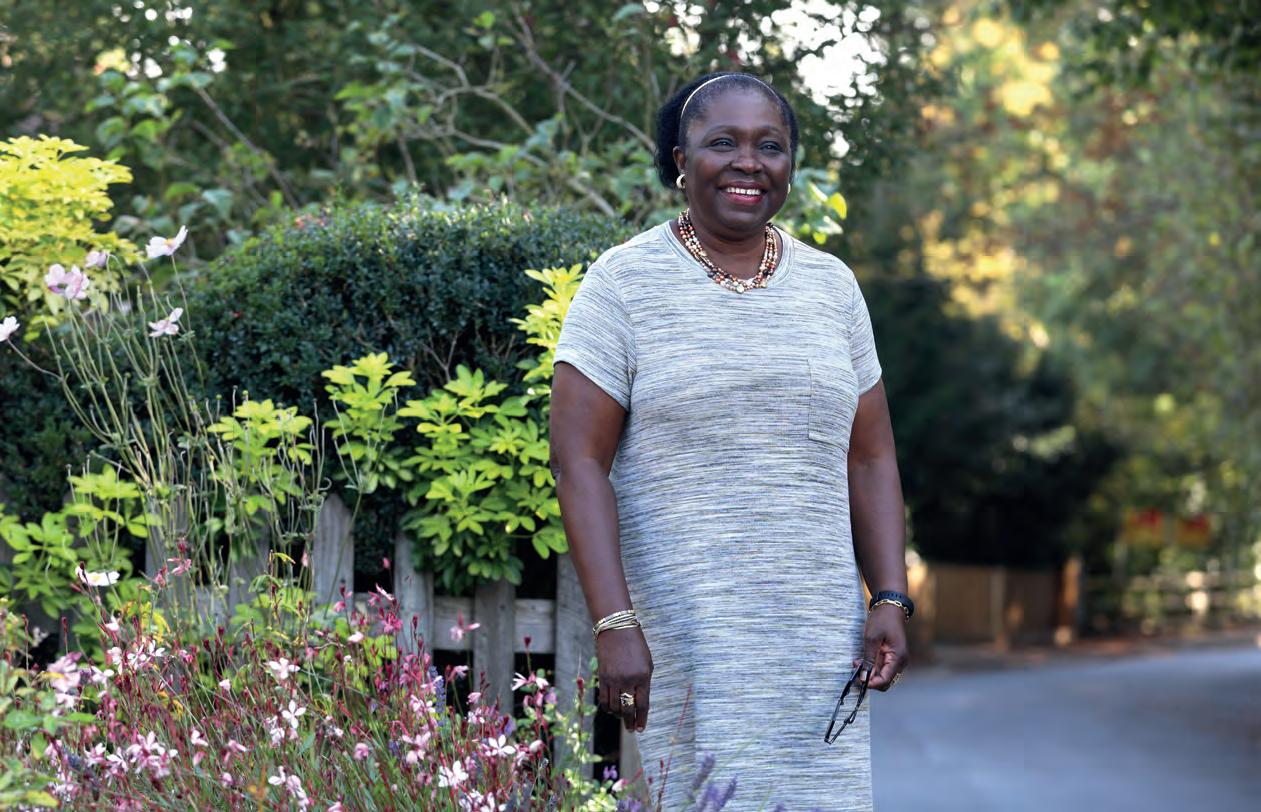
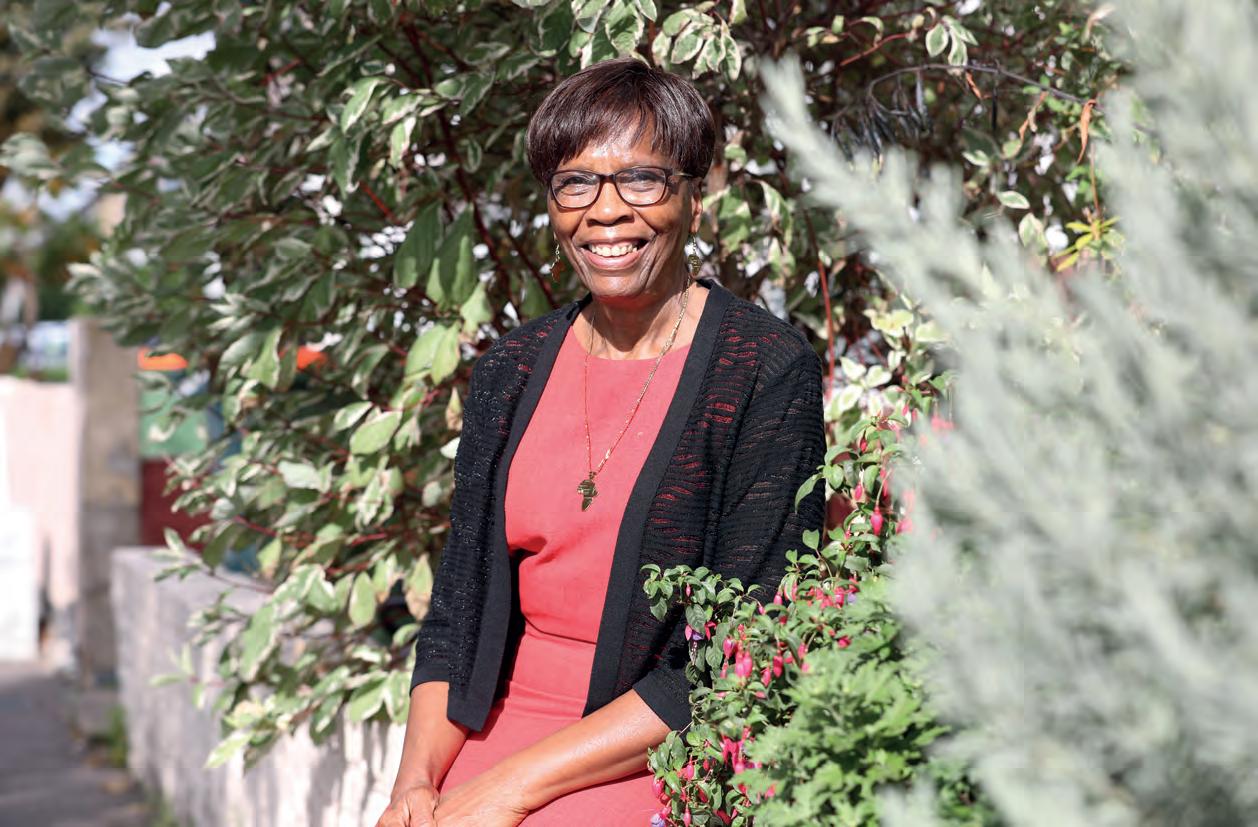
IN 1995, Marva was appointed to her first headship, joining a primary school in east London as its first Black leader and overseeing an entirely white staff.
“The first year was not fun,” she recalls with a wince. The national curriculum had been introduced by the Government a few years before, but the school, like others, had yet to implement it. Many staff had worked at the school for more than 20 years and wanted to keep doing what they had always done, the way they had always done it.
And they had no qualms about letting Marva know.
“Before I arrived, I met with the deputy head, who informed me that members of staff had stated, ‘if she comes here, she changes for us. We change for no-one’,” she recalls. “I was disrupting the status quo.”
Was her race an issue? She isn’t sure. “But racism isn’t something you can put in your hand and look at,” says Marva, adding: “You know, I think a white woman may have faced some of the same challenges around the new curriculum.”
That said, she remembers a teacher feeling free to remark: “Well, they needed a Black head in Newham, didn’t they?”
“In those days, there was the notion that if you were a Black leader of any sort, you were a token,” says Marva, but she was confident in her skills, abilities and track
record in education, and being a wellknown activist in Newham, she was used to challenging and being challenged.
In short, she got on with the job of leading changes in the school.
Still, the absence of any support or training for new heads at that time – “you did an interview and a presentation, you got a set of keys, and you took on the headship” – was testing.
It was Marva’s mentor who got her through and they still meet up. “She kept me in education. I couldn’t have quit though because for me, as a Black woman, I couldn’t be seen to be throwing the towel in,” she says. “But what I didn’t have was an experienced, Black head teacher I could call on. There was nobody I knew who was having the same experience as me.”
Today, while many Black teachers still find themselves as the only one in their school, they can at least draw on support from the networks of Black educators that now exist, and anyone who feels stuck or
discriminated against will usually know another Black teacher in another place who they can turn to for help.
“Even if you are the only Black teacher in your school, you are very rarely on your own,” says Marva.
For example, the NEU has four Equal Access to Promotion WhatsApp groups, which Marva and Dolapo Ogunbawo manage. It is not uncommon for them to be contacted via WhatsApp or other platforms such as LinkedIn, out of the blue by someone they have never met who is in desperate need of support and advice.
“Sometimes people get in contact because they just want someone like me to reassure them, to say ‘yes I know, I’ve heard this story before’. Some people just want to feel safe. They want to know they aren’t losing it. They want to know they aren’t imagining some of these things that are happening. They want to know it could be racism, that they aren’t paranoid.”
Racism in school workplaces, covert and overt, together with the isolation of being the only non-white staff member, can hamper Black teachers’ progression. In too many cases, it simply ends careers.
A 2020 report by University College London (UCL)’s Institute of Education (IoE), Making progress?, found that in addition to the excessive workload heaped on all teachers, Black teachers are also coping with the ‘hidden workload’ of racism.
Marva says that while all teachers might have the misfortune to be managed
“I didn’t have an experienced, Black head teacher I could call on.”
by someone who flatly dismisses their desire to progress with the words “you’re not ready yet. I’ll tell you when you’re ready”, this happens a lot to Black teachers and causes significant distress.
“I call this plantation leadership,” she says. “I own you because I’m your head teacher. There really are some leaders out there trying to strip the confidence from their staff, some who think they own them. Yes, some teachers may not be ready for promotion, that’s true, but the response should be ‘ok, what can we do to help you prepare?’, not simply ‘you’re not ready’.”
This is where the new programme, Positioned for success, delivered in partnership with the NEU, comes in. Written and delivered by Marva and Dolapo, its aim is to support Black teachers with more than three years’ experience to prepare for the next step in their career.
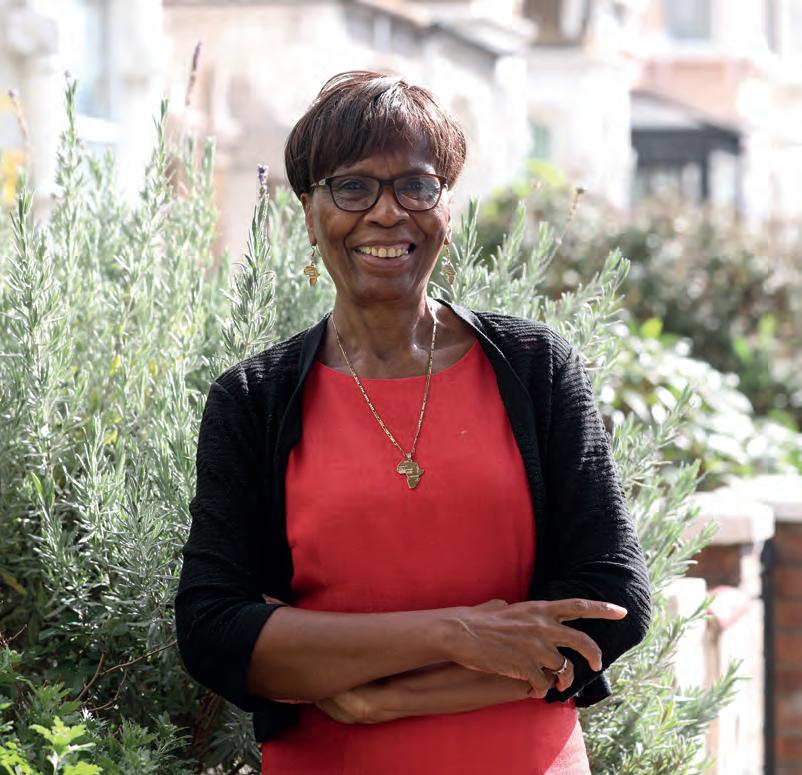
Starting with a session on obstacles and enablers to promotion, with senior leaders’ attitudes a key one, it then moves on to practising and polishing the key skills needed to move into or upwards in leadership (see box).
“Black teachers get increased selfconfidence from sitting in a space with
Places on the six-month development programme are fully funded by the union. It is open to any Black teacher who has at least three years’ experience.
It will offer:
• opportunities to explore the Black experience of the job application, interview and promotion/appointment processes and the challenges and obstacles
• strategies to overcome obstacles
• strategies to raise your profile in the workplace
• opportunities to develop your vision as a leader
To find out more and apply for a place, go to neu.org.uk/blackleaders-course
people who look like them, being part of the group but also presenting and with people such as Dolapo and I who have walked the journey,” explains Marva. Together, she and Dolapo have been designing and delivering bespoke training for Black teachers since 2007 and they believe that to encourage more Black teachers to put themselves forward for promotion, addressing confidence is vital.
Positioned for success sessions include how to analyse job descriptions and, importantly, interrogate and understand the person specification used to shortlist. This covers the key areas applicants must address: the quality of their teaching and learning, their expectations of themselves and their children, how what they teach impacts on assessment, how they use data, safeguarding and child protection, curriculum development and working in teams.
Supporting statements filled with meaningful information, rather than cliché-ridden paragraphs that lack impact, are also a topic. “This whole thing about ‘I’m passionate about this, I’m passionate about that. I love children’. Ok, you can be passionate, but you don’t want half a dozen passionates in a supporting statement,” laughs Marva. “It’s exhausting. An overused and misunderstood word,
I think. However, this is not specific to Black candidates, as I have read a number of supporting statements written by all colleagues over the years.”
Building confidence isn’t an overnight fix. “You don’t wake up one morning and think ‘Oh, I feel confident now’. It grows from getting to practise some of the skills you need and being in an environment with people who support you,” she says.
“MANY times over the past 15 years, I have been asked: what does a bespoke training programme for Black teachers do that a generic course doesn’t?,” says Dolapo.
Within the enquiry lurks a suggestion that perhaps Black candidates may need some additional training to address some deficit before they can apply for promotion, she feels. “We keep having to explain that people going through a bespoke programme are not doing so because they are in some way damaged and need to go through another layer of training to make them whole before they can present themselves as a candidate for a job,” she says.
If the course is designed to fill any gap, then it may be self-belief or confidence – to instil it where it is yet to
exist or replace it where it has been lost. The latter can come from experiences of discrimination in the workplace. “Many are told they are an angry Black woman, or an angry Black man, so they then become silenced. They lose their voice,” says Dolapo. “Many Black teachers find they are working in isolation. That is terrifying on its own. Then, knowing – even at the back of your mind – all the stereotypes out there, the teacher feels a bit wary,” she says. “Confidence also comes from knowing you are well-prepared for what you are going to face. That will enable more Black teachers to go forward and apply, knowing there is support for them.”
She adds that many Black teacher recruits leave before their third year,
frustrated because they cannot see a way to progress in their career. “They complain heavily of discrimination, so they don’t even get to middle leadership. On our course, Marva and I want to take teachers and give them the confidence they need for their journey and career progression.”
Although an experienced school leader like Marva, Dolapo has never worked in a school in the UK. Relocating from Nigeria in 2004, she joined the UCL Institute of Education (IOE) as programme manager of the then National College for School Leadership training programmes.
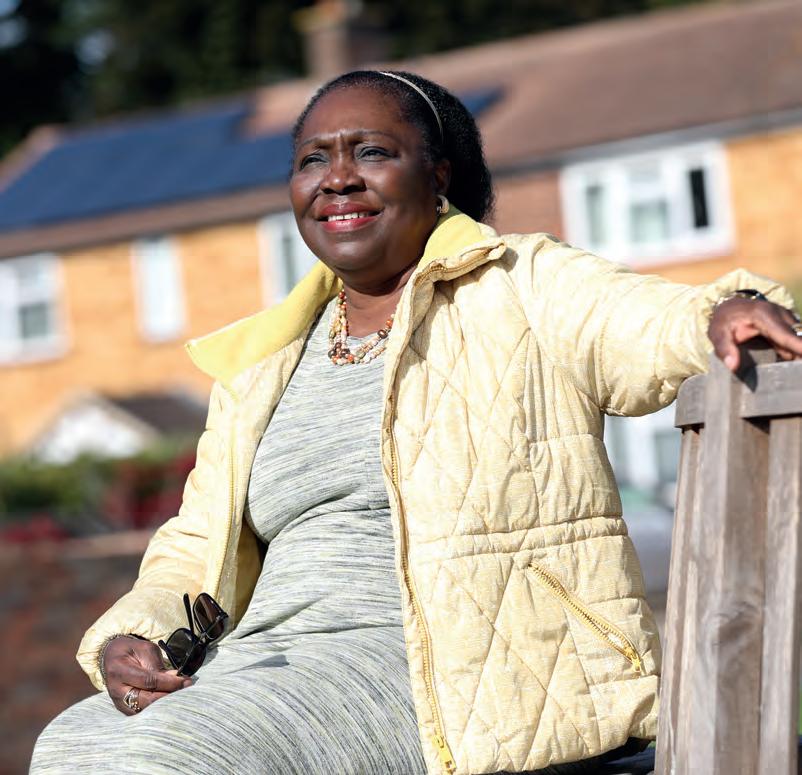
It was eye-opening.
“I had not been aware of the glass ceiling that exists for Black teachers here,” she says. “But it quickly became clear to me because every time we did the recruitment for the course, when I stood at the front of the hall introducing myself as the programme manager, I would notice the very few Black teachers in the group.
“Their eyes would light up and during the first break they would come to me and say ‘you don’t know how happy we are that you came in and introduced yourself as the programme manager because we have been so scared we won’t be able to open our mouths because the atmosphere will be against us’. That was a heavy burden for me. I just wasn’t expecting that.”
She found that there were very few applications from Black teachers for the National College’s generic leadership training, perhaps one or two per cent at most.
Together, Dolapo and Marva, who had met through their work for the IOE, turned their thinking to designing and developing a course aimed specifically at Black teachers and have been working together since. They remain in contact with their first cohort from 2007, who still come together to support one another.
“Life is hard, and it’s hard for everybody. What we all need, all of us, is to be in that little group that we know will be there for us, where we can rant without the fear of being judged, where we can even weep to our heart’s content, and the group will then pat us on the back and say ‘enough of that. Go and wash your face, out you go and face them’,” says Dolapo.
Working on your professional development alongside others who may share your experiences, can bring mutual support and the start of a support network for the future. It will be needed.
Does Dolapo feel the anti-racist practice that many schools have been steadily adopting over the past two years, including unconscious bias training in recruitment, offer any hope that things will improve for Black teachers and their opportunities to progress?
“I am optimistic. Things will change. Nothing remains the same forever. Some people will maybe try to make the change go slower but I find what is happening now heartening,” Dolapo reflects. “A school where I had spoken about Positioned for success invited me to speak about equality and diversity in September. Many schools are taking it on board.
“There will be, of course, some who are doing this as a tick-box exercise, but we will also find many who are willing to understand so why would I not see that as a plus? But a school must move from just having the training to translating that training into practice and reviewing its practice from time to time, that’s when the change will happen. For me, even allowing someone to stand in front of them and talk about it is a plus. If we keep talking about it, it will eventually get through.”
lead. The magazine for NEU Leadership
“Many Black teachers find they are working in isolation. That is terrifying on its own.”Dolapo Ogunbawo says many Black teachers leave before their third year
AT St Andrew’s College, teachers work with some of the most mentally unwell young people in the country. The school, which offers a full curriculum, is part of the child and adolescent mental health service for 13- to 18-year-olds based at the charity St Andrew’s Healthcare in Northampton.
It has capacity for 45 young people. The average length of stay is a year.
In 2021, head teacher and NEU Leadership member Cheryl Smith began to think about how her team could share its expertise with schools to help educators spot the early signs of mental distress among pupils, take action and, in turn, help reduce the number being admitted to the unit.
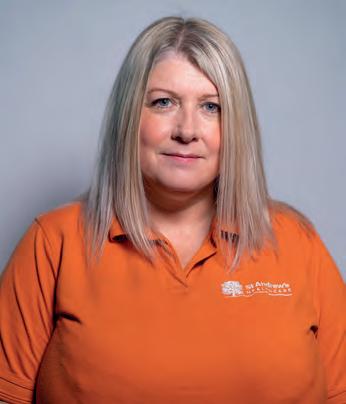
She launched LightBulb.
“We feel we have a bit of a social and moral duty to get out there and try to help young people find better coping strategies or support before things hit crisis point,” she explains. “We have some complex and poorly children coming to us, and it takes us a long time to rebuild them and get them ready to get back out into the community. We all know that if some of those children had had support earlier, and things had been picked up and signposted, potentially they wouldn’t have ended up in hospital.”
She adds that some of the young people arriving at St Andrew’s have had a very negative experience at mainstream school, where – for whatever reason –they haven’t been given the support they
needed. Sometimes their genuine mental health need has been misinterpreted as a behavioural problem.
LightBulb, which won a health award earlier this year, is delivered by Paul Hanrahan and Peter Rainford, two of St Andrew’s 13 teachers. They have worked with 35 schools, a mix of primary and secondary, so far.
Schools signing up receive an introductory phone call from Paul and Peter, where they discuss the process and identify what the school wishes to get out of the programme. For example, workshops content, a wellbeing cafe, deciding upon the content of the training they would like, or talking about how LightBulb runs and what the key
milestones are for the school.
The programme is based around a wheel, which is aligned with the Ofsted framework (see image, opposite), and schools are expected to collate evidence on how they are meeting the descriptors. With help from Paul and Peter, the school looks at areas with good policies and also identifies gaps.
Five hours of webinar training are provided as part of the programme, and schools can choose from a selection offered by the team. Self-harm, anxiety, eating disorders and social media are among the modules offered.
Anxiety is one of the most common issues parents raise, says Cheryl, with children worried about exams, changing schools and changing class over the summer. Health anxiety has, of course, risen because of the Covid-19 pandemic. Younger children in particular have been anxious about going to school and leaving their parents.
The self-harm training session is particularly sought after by secondary schools, which often do not know how to support those pupils who need it, says Cheryl. So, too, is the session on eating disorders. “Social media creates a lot of pressure to look a certain way and even young children now are looking to have lip fillers in this quest to be perfect,” she explains, adding that bullying on social media is common but young people don’t realise that what they are experiencing is damaging them.
Inspired by a sense of moral and social duty, Cheryl Smith launched a mental health awareness programme to share her team’s expertise. Words Sally Gillen.Cheryl Smith launched LightBulb to help schools identify early signs of mental distress in children
LightBulb costs £1 per pupil, so a school with 800 students would pay £800. However, sponsorship from local businesses that have partnered with St Andrew’s Healthcare means those schools in the greatest need can access the programme for free – for example, where Ofsted has identi ed safeguarding concerns, or where there are high levels of bullying, or sometimes where the school has made a speci c commitment to addressing mental health and the LightBulb team feels there will be strong outcome and progress.

“It is hard as we would like to o er it to all schools free of charge, but clearly that is not going to be possible. We also o er a simple package of training only if that’s what a school would like,” says Cheryl.


At the end of the programme, when the evidence has been collated, the LightBulb team visits the school to meet the senior leadership team, the designated safeguarding lead and parents. ey look at the curriculum and produce a report highlighting good practice and any areas requiring more work. e school is awarded a LightBulb certi cate.








“We want to create an environment where children feel they can tell their teachers anything, and ask for help if they need it,” says Cheryl. To make this happen, we need to make sure schools are able to recognise potential mental health issues before they become bigger. We want to improve the culture within schools so that mental health and wellbeing is rmly on the daily agenda.”
To nd out more about the programme, contact Lightbulb@stah.org


The LightBulb programme is based on a wheel of evidence

Wellbeing cafes for pupils and parents and training for sta –how LightBulb helped one school















AS the then lead for mental health and wellbeing at Hardingstone Primary in Northamptonshire, teacher Sam Longden began working with LightBulb in 2021.
The team created a video for parents on the school website about how to support children experiencing anxiety, and some continuing professional development around growth mindset and trauma-informed care for sta . “The training was tailored to the school and the children coming through our door and the issues we were seeing at the time because of the pandemic. There were children who were
previously happy and positive who were changing before our eyes,” explains Sam. “Many were anxious, and their families were raising concerns.”
Signs of what mental ill-health might look like – for example, a child who is reluctant to work, a change in appearance, a drop in academic performance –were covered in the training. It also equipped sta with the skills to ask sometimes uncomfortable questions in a safe, supportive way, and to raise concerns with senior members of sta , families and the children themselves.


The team also worked with year 6
pupils on some transitions work, focusing on the skills needed for moving to secondary school, including working out of your comfort zone, teamwork and communication.
Throughout the day, wellbeing cafe sessions were held, where pupils could drop in and chat with sta about transition and change. Parents were also invited.
Of the overall programme of work, Sam says: “We wanted to create a culture and everyday language around mental health and wellbeing in school, and Cheryl and her team were extremely supportive.” lead. The magazine for NEU Leadership members



“We want to create an environment where children feel they can tell their teachers anything.”

THE impact of the cost-of-living crisis on parents and students, soaring energy bills at a time when budgets are already overstretched and the knock-on e ect of the recruitment and retention crisis on senior leaders’ workload. ese are just some of the issues NEU Leadership members are discussing on the community Guild app, a WhatsApp-style professional messaging space for leaders.
e app is a secure, easy-to-use, private digital platform. It is provided by technology company Guild and content is curated by the NEU.
“ is is a really useful tool for NEU leader members, and I’m looking forward to more and more leaders joining as they hear about it,” says NEU National Leadership Council vice-chair Josie Whiteley. “In a rapidly changing environment, it o ers me a really useful way to stay in touch with others facing the same issues. It o ers me a real opportunity to chat to others in a safe and professional space – ask a question and someone will share their thoughts with you.”
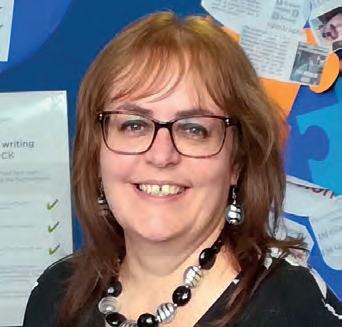
What is the purpose of the app?
It is a space for you to: connect, learn from, and collaborate with other leaders in education discuss challenges, seek advice, share ideas and support each other discuss local and national education issues campaign and in uence collectively for a better education system for all provide experiences and stories to inform NEU policy development and direction encourage each other to get involved in the work of the union build local and national leadership networks to minimise feelings of isolation.
Who is it for?
is community is for NEU Leadership members comprising: head teachers and principals deputy head teachers and vice-principals
assistant head teachers and assistant principals
heads of centres, schools and post-16 colleges leaders in the independent sector leaders in further education executive head teachers leaders of multi-academy trusts directors and assistant directors of education business managers, bursars and further education nance managers.
Who else is involved?
e professional community space is led and driven by NEU leaders to motivate and inspire other leadership members. Guild will work in partnership with a small number of NEU sta and NEU leaders joining the community to promote positive connections to bene t education and the education profession. NEU sta will post upcoming events and information that may be of interest to leaders.
ere are just four steps:
1. Register at guild.co/app/set-up-account or by downloading the app from the App Store or Google Play – just search for ‘Guild app’.
2. Once registered, email guildenquiries@ neu.org.uk and request to join the NEU community.
3. A link will be sent to your email address in a few days. Click on the link to join the NEU Leadership community.
4. After joining, you will see a welcome message, which sets out the purpose of the community group and who is involved.
e NEU behaviour statement can also be found here and explains the expectations for the group. We ask that leaders add their photo and complete the pro le section to introduce themselves.
Once leaders have joined, they can add a comment or ask a question on the platform. Click on an existing topic to continue the conversation, or start a new topic by clicking New Conversation.

Does the app give me access to individual support?
Leaders can nd direct messaging on a one-to-one basis with a peer an additional bene t. is allows members to raise queries and concerns that may otherwise be di cult to share on the larger platform. A member can direct message another leader by clicking on their photo. e phrase New Direct Message will appear and communication created here can only be seen between two members.
Join and collaborate with other leadership members to network, o er peer support and build the union movement. Register now for the app and request to join the exclusive NEU Leadership community.
lead. The magazine for NEU Leadership

The NEU Leadership community Guild app is a private digital platform especially for leaders and an exclusive member benefit.
“It offers me a real opportunity to chat to others in a safe and professional space.”NEU National Leadership Council vice-chair Josie Whiteley
IN sectors such as health and social care, individuals access professional supervision throughout their career, but only in the last couple of years has the model started to be piloted in education.

Across the country, leaders have been signing up to a number of trial professional supervision programmes, one of them delivered by charity Education Support.
But what is professional supervision? Education Support’s director of programmes Faye McGuinness starts by explaining what it is not.
Education Support’s fully funded programmes help support leaders. Sally Gillen speaks to director of programmes Faye McGuinness.
“It isn’t therapy. It isn’t counselling. It isn’t a clinical service,” she says. “It is a space where the supervisor is able to hold a systemic view of the leader as an individual working in the education system at a particular point in time and then allow the leader to reflect on any particular challenges or successes. It allows them to acknowledge and digest the emotionally difficult aspects of their work.”
She adds that the key point about professional supervision, which is different from therapy, is that the supervisor will always bring it back to the impact on the individual as a professional, even if much of what is discussed in the sessions might be around what is driving them personally.
Supervision shares some characteristics with mentoring and coaching, but the key difference is that it isn’t goal oriented. Instead, it is a space to reflect.
Leaders, a mix of experienced and inexperienced, have been signing up for the programme. It is delivered in six, hour-long sessions, usually over Zoom.
Topics and themes arising include dealing with imposter syndrome and the current struggles many leaders are experiencing with interpersonal relationships, inside and outside work.
“There is quite a lot of strain on relationships because pressure is high and resilience is low,” explains Faye. “Leaders are trying to hold this space where they recognise it is very difficult for their staff, so they take that burden on. One of the things we might start to see is a kind of moral injury, which is what happens when individuals have to do things that go against their moral code. This happens a lot in healthcare, for example, where staff have to make decisions about which patients will receive treatment.
“There are leaders who know how tough things are for their staff, and not just at work, but because of the cost of living and everything else. Yet leaders still need those staff to work hard. But that goes against their values as a leader. It’s a really difficult place to be working from.”
The mix of leaders signing up for
supervision is interesting, Faye feels, because it shows that wherever people are on their journey in the profession, they are reaching out because they feel they need that space to think and reflect. In many cases, it is the pressures of the past few years that may have led them to sign up, but in reality once they start the process they find it is a cumulative effect of many years in the role that has led them to the point where they need professional supervision.
In addition to the one-to-one supervision, Education Support is also offering group peer-to-peer support, groups of half a dozen leaders whose discussion is facilitated by an accredited coach. Again, it is offered in six sessions. but when they are up, many leaders stay in touch and continue to support one another.
Both individual professional supervision and peer-to-peer support allow leaders to hear and see from a different perspective. In the case of peerto-peer sessions, hearing another five or six perspectives helps leaders, especially if they are feeling isolated or uncertain.
“Individuals can get into negative thought patterns, and once you do it’s very hard to break them. If you’re in that inward, rumination phase, having other perspectives really helps,” says Faye. “Supervision is something leaders should be accessing throughout their career. Good-quality reflection makes leaders better. It shouldn’t just be there for when you’re in crisis mode. Probably the best supervision happens when somebody is not completely with their back up against the wall.”

An independent evaluation of the service is underway, and the findings will be published next year. Early data shows a number of benefits. Education Support is using the Warwick-Edinburgh Mental Wellbeing Scale, which is designed to assess a population’s mental wellbeing, to look at leaders’ mental health before and after the intervention.
One of the things they are being asked is how connected they feel to their purpose, and there has been a huge jump, says Faye. “Leaders are telling us that they feel heard, which is new for some of them. Their wellbeing has improved, and they feel more connected to their purpose. They feel they have tools and techniques they didn’t have in their toolbox. They have more fuel in the tank.”
To find out more go to tinyurl.com/5n7kyr53
lead. The magazine for NEU Leadership
“Good-quality reflection makes leaders better. It shouldn’t just be there for when you are in crisis mode.”Faye McGuinness is director of programmes at charity Education Support
SCHOOL and college leaders expect their working lives to be challenging. ey are used to coping with the unexpected and are experts at riding the wave of uncertainty that seems to be the new normality nowadays.

School leaders’ patience was tested further when the Government’s education recovery agship policy, the national tutoring programme, was awarded to Randstad, a Dutch company with – and it’s hard even to write this – no experience of running a tutoring programme. e consequence was that £5bn of public money was wasted. Eventually, and way after time, Randstad was axed from the national tutoring programme contract, as the Government reluctantly accepted that the £349 million of tutoring money for 2022/23 should be paid directly to schools.
Bousted Joint general secretary, National Education Unionneu.org.uk
facebook.com/ national education union
NEUnion
Leaders coped with Covid and the dysfunction of the Department for Education, which proved itself unable, throughout the pandemic, to communicate e ectively with the school leaders it relied so heavily upon. Two years of exam disruption caused by mutant algorithms (year 1) and a denial of reality (year 2) by Gavin Williamson, the then Education Secretary, who was utterly con dent that exams would go ahead in 2021 when it was obvious that such con dence was completely misplaced, have hardened leaders to the incompetence of Government ministers.
It is not as if things got better after the worst of the pandemic was over. Despite Boris Johnson’s assurance that education recovery was the Government’s top priority, schools got merely a third of the £15bn education recovery funds that the Government’s own recovery tzar, Sir Kevan Collins, said were needed to repair the damage done to pupils’ progress and learning by the pandemic.
I would love, at this point, to be able to write that this is a Government that has learned from the error of its ways, is willing to listen to the profession and to learn. I must, however, be honest and say that I see no sign of a change of direction. Partly this is because of the extreme instability of the Conservative Party – an instability that has resulted in ve Education Secretaries just this year. Now with a new (but for how long?) Prime Minister, it is far from clear what will happen next. It would be a brave union leader who made con dent predictions on what Government will do next, but I do not lack courage – so here are my thoughts on where ministerial thoughts will be heading.
e Schools Bill, which was to pave the way for the full academisation of schools, will be scrapped. It was an extremely poor, thin piece of legislation that managed to upset Conservative grandees in the Lords. Conservative councillors are, in my experience, as opposed to compulsory academisation as their Labour counterparts.

e grammar school expansion promised by former Prime Minister Liz Truss in her election campaign is more sound than substance. She would have to bring in enabling legislation and there is no guarantee that this would pass in the Commons, and it would be strongly opposed in the Lords. It is a row that she cannot, now, a ord to have.
Schools will face continuing funding crises next year: 37 per cent of primary schools and 26 per cent of secondary schools will see their funding rise by just one per cent next year. Even in the best-case scenario just eight per cent of primary schools and one per cent of secondary schools will see their per-pupil funding rise by ve per cent. With in ation running at over ten per cent, and likely to remain high into 2023, the funding crisis for schools will continue. Leaders will be forced to make a series of unpalatable choices – further narrowing the curriculum (already the narrowest in the OECD post-16); reducing support services; dealing with sta ng shortages and so on.
School leaders, post-pandemic, deserve so much better than this. And so do their sta and their pupils.
“I would love, at this point, to be able to write that this is a Government that has learned from the error of its ways, is willing to listen to the profession and to learn.”Mary


